'Hot' situation of shrimp ponds discharging waste causing environmental pollution
(Baonghean.vn) - Industrial shrimp farming, due to high density and the farming process requiring the use of drugs and chemicals for treatment, has a very high risk of causing pollution to the environment due to the discharge of wastewater into the environment. Currently, shrimp farms in Nghe An are warning about the discharge of wastewater causing environmental pollution...
Warning of pollution in industrial shrimp farming areas
In mid-July, a number of households in Tan Minh hamlet, Quynh Lap commune (Hoang Mai town) sent a petition to the Chairman of the Provincial and Town People's Committees, complaining about the shrimp ponds of Le Duy Khanh enterprise and a number of other shrimp pond owners who built industrial shrimp ponds but did not have a wastewater treatment system and discharged wastewater directly onto Tan Minh hamlet beach, causing serious pollution.
Ms. Le Thi Neo, a resident of Tan Minh hamlet, was upset: The situation of polluting waste discharge has been going on for 2-3 years now. People have petitioned many times but it has not been resolved. Now, due to the prolonged heat wave and businesses are ignoring it, discharging foul-smelling water into the sea, people cannot stand it so they have to petition the province to resolve it.
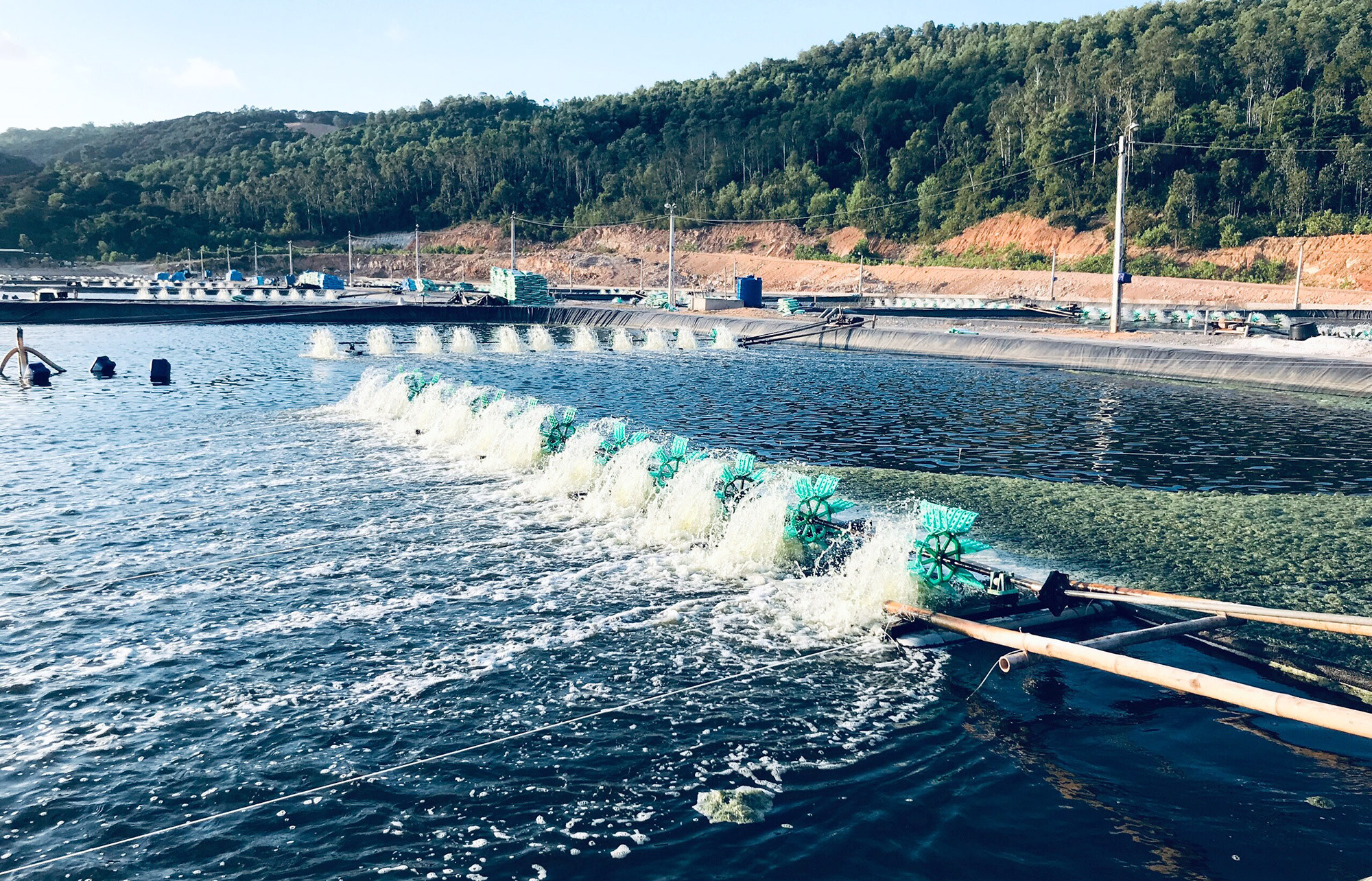 |
| Industrial shrimp pond in Quynh Lap commune, Hoang Mai town. Photo: Nguyen Hai |
In addition to the above incident, not long ago, at the shrimp pond in Quynh Thuan commune, although the farming area was only a few dozen hectares, there were conflicts and disputes between the shrimp pond owner and some salt-making households in the commune.
The reason is that shrimp pond owners often take advantage of quiet times to pump wastewater from shrimp ponds into salt fields, causing water pollution, making salt production impossible or reducing productivity. According to some households, when washing their feet and hands with this water source, they feel itchy and have a very unpleasant smell. The situation was only temporarily calmed when the hamlet committee and the commune People's Committee had to intervene and request shrimp pond owners not to discharge wastewater into salt production ditches.
A resident living along the Mo River in Quynh Luong Commune shared: Before there were no shrimp ponds, fish and shrimp could still live normally. Every month, according to the tide, shrimp, crabs and all kinds of fish could be caught. However, since industrial shrimp farming began, the canals have been poisoned and no living creatures can survive. Not only that, in areas with high density shrimp farming, the water discharged from shrimp ponds into the environment is black, has a very unpleasant smell and no one dares to wash their feet and hands.
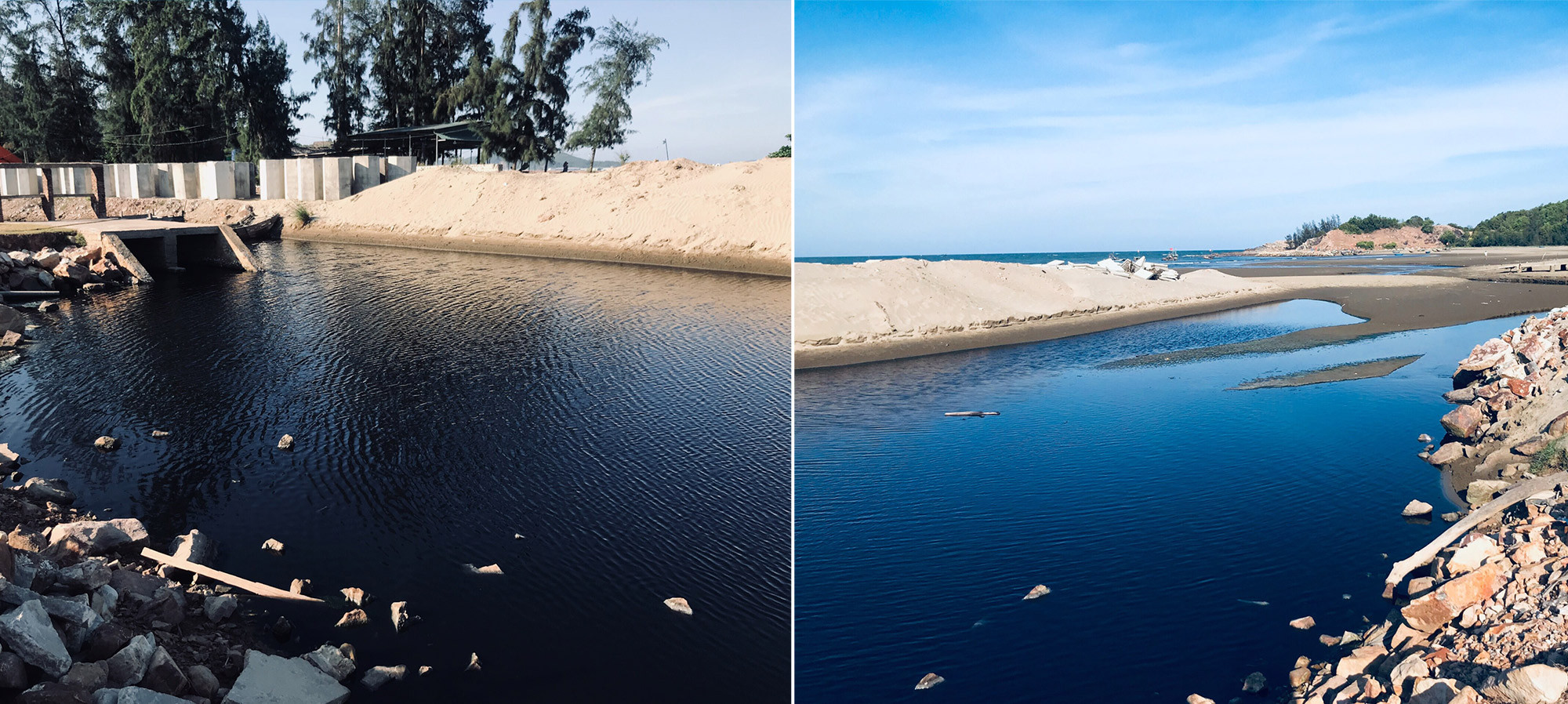 |
| Water from a shrimp pond in Quynh Lap, Hoang Mai town, discharged directly into the sea is black and polluted. Photo: Nguyen Hai |
Because of the high risk of environmental pollution, planning must be the top priority when building each industrial shrimp farming area. In Nghe An, in order to develop shrimp farming, since 2000, the province has planned large farming areas in the localities of Quynh Bang, Quynh Thuan (Quynh Luu) or Quynh Di, Quynh Xuan, Quynh Lien, Quynh Lap (Hoang Mai Town); Dien Trung, Dien Kim (Dien Chau), Nghi Hop, Nghi Khanh (Nghi Loc), Hung Hoa (Vinh City), then invested in water supply infrastructure.
However, over time, due to lack of supervision and partly limited funding, instead of investing in synchronous and systematic infrastructure as the southern provinces and enterprises often do (the farming system includes a system of ditches to bring seawater into separate ponds, independent of the wastewater drainage system and the settling pond system to treat wastewater from shrimp ponds before discharging into the environment), concentrated shrimp farming areas only invest in building water supply ditches and culverts, without a wastewater drainage system. When put into operation, shrimp pond owners often discharge water directly into the common ditches after treating the ponds, and the water supply becomes a ditch to contain wastewater. Therefore, the environment in shrimp farming areas is increasingly polluted and no one dares to use the common ditch system.
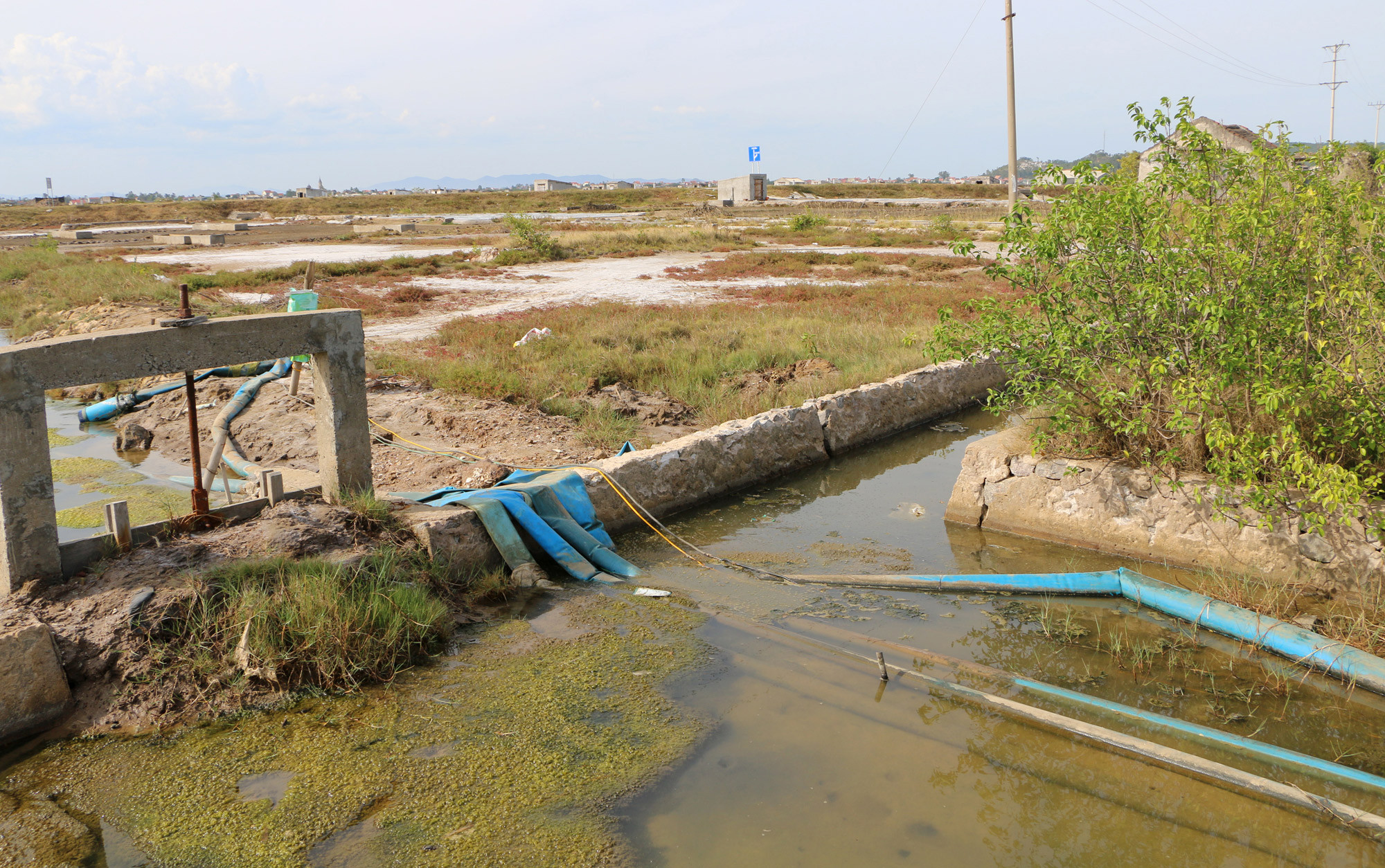 |
| Shrimp pond owners in Quynh Thuan and Quynh Luu take water into their ponds from salt production ditches but are also ready to discharge it into the salt fields. Photo: Nguyen Hai |
Consequences of breaking shrimp farming planning
In planned shrimp farming areas, it is like that, but in unplanned shrimp farming areas or shrimp farming areas that break the plan, it is even more complicated because everything is spontaneous and everyone does their own thing. Although they see the harm caused by environmental pollution, because of the need for economic development, the locality also makes concessions; people only see immediate benefits, so they disregard the State's regulations and continuously reclaim and expand the area of ponds and lagoons to raise brackish shrimp. The "hottest" situation in the past 2 years is in Quynh Lap commune (Hoang Mai town) when in just 1 year, people massively converted hundreds of hectares of coastal hill land, and some businesses even rented land in Dong Hoi Industrial Park close to the sea, investing billions of dong to convert it into industrial shrimp ponds.
The situation is similar in Quynh Luu district, where people in An Hoa, Quynh Yen, Quynh Thanh, Quynh Luong, Son Hai, Quynh Ngoc communes... find every way to renovate and bring salt water into ponds and gardens to raise shrimp despite planning. After being reported by people, the commune and district inspected and made records of the above violations, but people still took advantage of loopholes to renovate ponds and lagoons for farming.
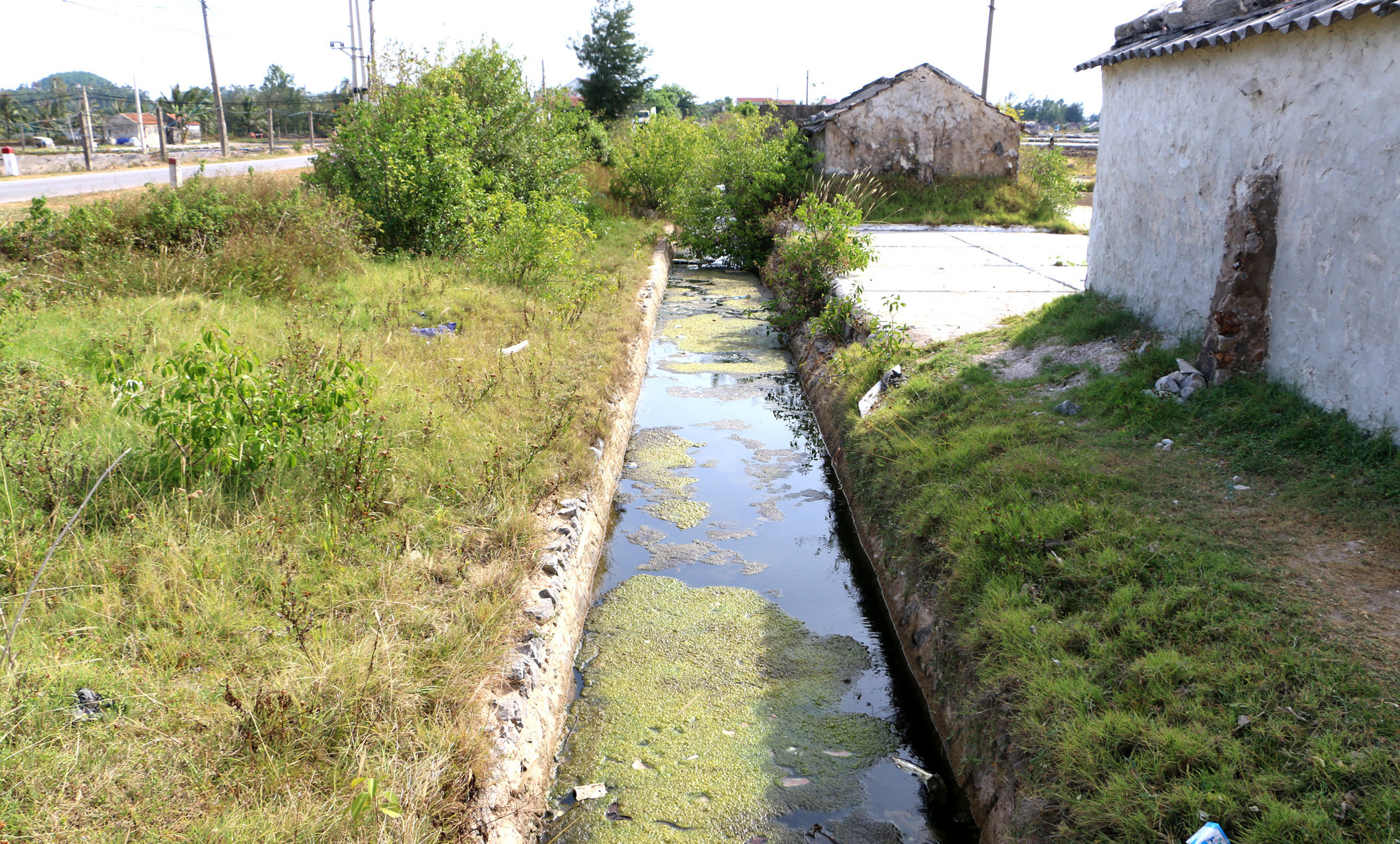 |
| Wastewater from the shrimp pond is discharged directly into the salt production ditch of Quynh Thuan commune. Photo: Nguyen Hai |
Through the press, the Department has received information about environmental pollution caused by shrimp pond discharge in Tan Minh hamlet, Quynh Lap commune. For now, the Provincial People's Committee is assigning the People's Committee of Hoang Mai town to inspect and resolve. The Department plans to conduct inspections, take samples for monitoring and determine the cause of pollution. Based on identifying the polluter, the Department will coordinate with relevant agencies to inspect environmental protection records and request solutions to handle and remedy the situation according to regulations.
Besides breaking the planning and expanding the area for brackish water shrimp farming, recently in Quynh Luu district there has been a movement to bring whiteleg shrimp into freshwater fields. Accordingly, after renovating the pond, people still put shrimp larvae into freshwater ponds and lagoons and occasionally put salt at a ratio of 1/1,000 into the ponds and lagoons to create minerals for the shrimp.
Although the productivity and value are not as high as brackish water shrimp farming, farmers are excited because of less risk and higher profits compared to rice farming. Currently, Quynh Luu district has about 45 hectares of freshwater shrimp, of which Quynh Yen commune has about 30 hectares and the rest are in Quynh Hung and Quynh Ngoc communes.
Regarding freshwater shrimp farming, although it is a new and effective model for farmers, the district does not encourage expansion, because freshwater shrimp farming still requires adding salt to the fields. If not managed and controlled well, there is a risk of salinization of the fields and pollution of the surrounding environment, affecting rice production land.
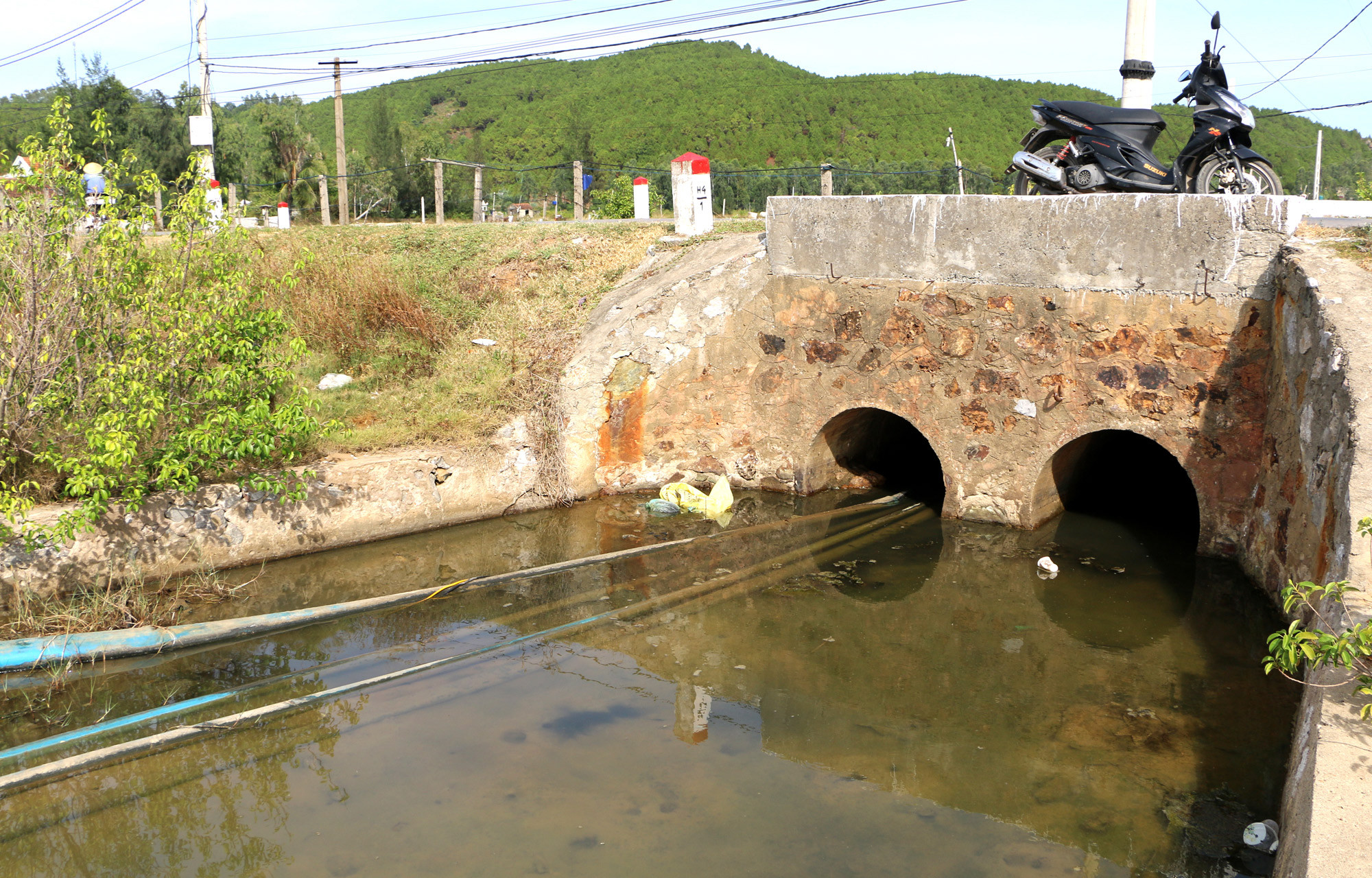 |
| The drainage ditches of shrimp ponds are almost devoid of any living seafood. Photo: Nguyen Hai |
According to an agricultural expert, converting rice fields to brackish water farming only takes a few crops, but renovating and sweetening a saline area takes hundreds of years. Therefore, to maintain rice fields and reduce the impact of environmental pollution from industrial shrimp farming areas on the surrounding environment, localities must evaluate, review planning, and strictly manage shrimp farming areas; areas that are not allowed to be converted to shrimp farming must remain the same; violations and illegal land conversion must be handled more resolutely and thoroughly.

